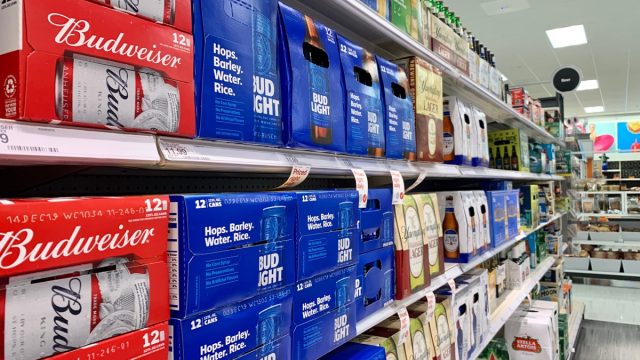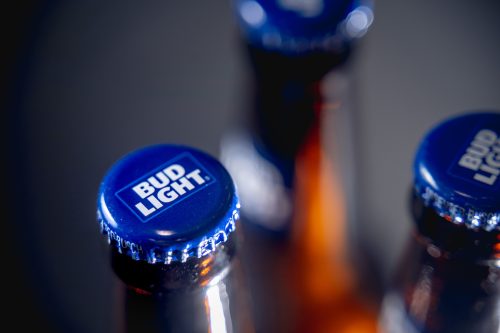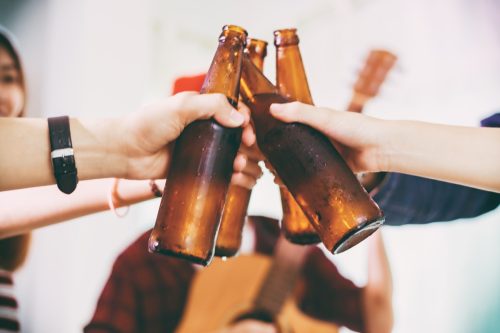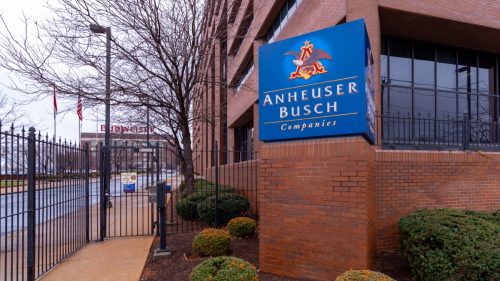Bud Light Is Completely Getting Rid of This in Its New Beer

Bud Light continues to create innovative products beyond its original line of beers. In the past couple of years, the brand has launched seltzers and fruit-flavored beers—sometimes taking it too a level many would consider too far, like with pumpkin spice seltzer—to maintain a spot at the top of the industry. Now, the beer company is aiming to accommodate a specific audience with a new beer. For the newest beer, Bud Light is getting rid of one key element completely, and they’re the first company to do so. Read on to see what this new Bud Light beer will be missing.
RELATED: This Is the Most Popular Cheap Beer in America, According to Data.
Bud Light created a beer with no carbs.

Anheuser-Busch, the owner of Bud Light, told CNN Business on Sept. 16 that it will soon be launching a new product called Bud Light Next, the company’s first zero-carb beer. The product has been in development for years, but you can finally get your hands on a bottle in early 2022. According to the company, a 12-ounce serving of Bud Light Next is 4 percent alcohol-by-volume and just 80 calories, 30 fewer calories than a Bud Light, but boasting a similar amount of alcohol-by-volume. The biggest difference is that while Bud Light has 6.6 grams of carbs in a 12-ounce serving, Bud Light Next has zero.
Andy Goeler, vice president of marketing for Bud Light, told CNN that the taste of the zero-carb beer is “light, refreshing and clean,” with a hint of citrus. The beer will be sold in 6- or 12-packs of bottles or cans, and cost a bit more than Bud Light.
RELATED: This Is the Worst Cheap Beer in America, Customers Say in New Survey.
The zero-carb beer is targeted to younger, health-conscious drinkers.

According to Goeler, the zero-carb beer is intended to target younger, more health-conscious consumers, who are looking for a product with the nutritional profile of seltzer and the taste of beer. Bud Light Next is the “next generation of light beer for the next generation of beer drinkers,” Goeler said. He explained that Bud Light Next is part of the brand’s effort to continue “evolving and innovating” to meet the needs of different consumers. The brand hopes that the newest product will help shift the perception of Bud Light from “the light beer to the light brand,” Goeler added.
The trend of limiting carb intake has resulted in many low-carb beers, but this is the first zero-carb beer.

The company’s most recent innovation comes in response to the increasingly popular trend of cutting carbs, which has altered the habits of beer consumers across the country. Many companies have created low-carb brews, but Anheuser-Busch is the first major brewer to offer a beer completely devoid of carbs. Popular brands like Heineken, Yuengling, Amstel, and Corona now have low-carb beer, but Bud Light took the innovation one step further.
One of the most popular low-carb beers is Michelob Ultra, also owned by Anheuser-Busch, but Goeler doesn’t think that Bud Light Next will eclipse Michelob Ultra, since the product will be promoted with a “different vibe” than Michelob Ultra, which he says is a lifestyle brand geared toward active people. “Today’s consumers have got options of low-calorie and low-carb products. This is another entry to have something that goes all the way to zero carbs,” Goeler said. “It’s a big consumer trend we see across many consumer industries.”
RELATED: For more up-to-date information, sign up for our daily newsletter.
Creating Bud Light Next was considered to be near impossible.

Creating a zero-carb beer was no easy feat, Goeler said. Bud Light Next is a culmination of almost a decade of work and approximately 130 prototypes. According to Goeler, the process of creating the zero-carb beer was referred to internally as “Project Impossible.”
RELATED: This Is the State That Drinks the Most Beer, Data Shows.